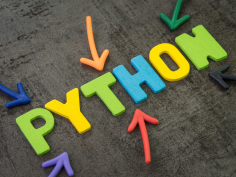In our Certification Course in Functional Programming with Python, you will delve into the fundamental principles and advanced techniques of functional programming using the Python programming language. This program is meticulously designed to equip you with the skills needed to excel in software development by mastering functional programming paradigms. Upon successful completion, you will be awarded a certification validating your expertise in functional programming with Python.
What you'll acquire:
- Core Functional Programming Concepts: Acquire a deep understanding of essential functional programming concepts, including higher-order functions, immutability, and lambda expressions.
- Python Functional Features: Master the functional programming features inherent in Python, such as map, filter, and reduce, enabling you to write concise and expressive code.
- Advanced Functional Techniques: Explore advanced techniques in functional programming, including recursion, closures, and currying, to enhance your programming prowess.
- Functional Design Patterns: Learn and apply functional design patterns to solve common programming challenges, fostering modular and reusable code.
- Comprehensive Curriculum: Access a well-structured curriculum and study materials that thoroughly prepare you to apply functional programming principles in real-world development scenarios.
- Certification: Upon completion of the course, you'll receive a recognized certificate validating your expertise in functional programming with Python.
Who Can Learn:
This certification program is ideal for individuals who aspire to excel in software development and programming, whether you're a recent graduate looking to enter the field or an experienced developer seeking to expand their skill set. Our comprehensive curriculum ensures you gain a thorough understanding of functional programming principles using Python.
Comprehensive Curriculum Featuring:
- Introduction: This unit introduces the fundamental principles of functional programming in Python. It lays the groundwork for understanding how functional programming differs from other programming paradigms and explores its benefits in terms of code organization and readability.
- The Five Tenets of Functional Programming: This section outlines the core tenets that define functional programming: immutability, first-class functions, pure functions, referential transparency, and lazy evaluation. Understanding these principles is crucial for effectively applying functional programming concepts.
- Functions as First-Class Objects: This unit delves into the concept of treating functions as first-class citizens, allowing them to be assigned to variables, passed as arguments, and returned as values. This flexibility enables higher-order functions and facilitates more expressive and modular code.
- Functions in Data Structures: Explore how functions can be seamlessly integrated into data structures, providing a concise and powerful way to manipulate and process collections of data.
- Higher-Order Functions (HOFs), at a Glance: This unit provides a quick overview of higher-order functions, emphasizing their role in functional programming and how they can simplify code by abstracting common patterns.
- Purity and Side Effects: Delve into the significance of writing pure functions and minimizing side effects, promoting predictability and ease of debugging in functional code.
- Laziness: This unit explores the concept of lazy evaluation, a strategy where computations are deferred until their results are actually needed. Lazy evaluation can lead to more efficient and modular code.
- Immutability: Understand the importance of immutability in functional programming and how it enhances code stability and reasoning.
- Aliasing: Explore the concept of aliasing and its implications in functional programming, emphasizing the avoidance of shared mutable state.
- Lambdas: This unit introduces lambda expressions, providing a concise way to create small, anonymous functions for use in functional programming.
- Map: Understand the map function and how it applies a given function to all items in an iterable, producing a new iterable with the results.
- Zip: Explore the zip function, which combines multiple iterables into a single iterable, allowing for parallel processing of corresponding elements.
- Filter: This unit covers the filter function, which selectively includes items from an iterable based on a given condition.
- Any and All: Understand the any and all functions, which operate on iterable and return True if any or all elements satisfy a specified condition, respectively.
- Reduce: Explore the reduce function, which successively applies a binary function to the items of an iterable, reducing it to a single accumulated result.
- Comprehensions: Learn about list comprehensions, a concise syntax for creating lists based on existing iterable.
- Set Comprehensions: Explore set comprehensions, a similar concept to list comprehensions but used for creating sets.
- Dictionary Comprehensions: Understand dictionary comprehensions, a convenient way to create dictionaries in a single line of code.
- Iterators: This unit introduces the concept of iterators, objects that can be iterated over, and how they fit into functional programming.
- Generators: Explore generator functions, which allow the creation of iterators using a simple and memory-efficient syntax.
- Variadic: Understand Variadic functions, which accept a variable number of arguments, providing flexibility in function design.
- Nested HOFs: Delve into the use of nested higher-order functions, demonstrating their ability to compose complex operations from simpler ones.
- Closures: Learn about closures, functions that "remember" the environment in which they were created, providing a way to retain state across multiple calls.
- Decorators: This unit introduces decorators, a powerful feature in Python that allows the modification or extension of functions at the time of their definition.
- Advanced Decorators: Explore more advanced decorator patterns and techniques, showcasing the versatility of decorators in functional programming.
- Recursion: Understand recursion as a programming technique, exploring how functions can call themselves to solve complex problems.
- Memoization: Delve into memoization, a caching technique to optimize recursive functions by storing and reusing previously computed results.
- Currying and Partials: Explore currying and partial application, techniques that involve transforming a function with multiple arguments into a sequence of functions each taking a single argument.
- Overloading and Polymorphism with a Single Dispatch: Understand how functional programming enables overloading and polymorphism through a single dispatch mechanism, enhancing code flexibility.
- Infinite Iterator: Explore the concept of infinite iterators, which generate an unbounded sequence of values, illustrating the power of laziness in functional programming.
- Appendix Complete Python Fundamentals: This unit serves as a supplementary guide, ensuring a solid foundation in Python fundamentals for those new to the language. Covering essential topics such as data types, control structures, and object-oriented programming, this appendix ensures that learners are well-equipped to grasp functional programming concepts in Python.
Your Gateway to Programming Excellence:
This certification course serves as your gateway to a successful career in software development, equipped with the powerful tool of functional programming in Python. Our goal is to empower you with the skills and knowledge necessary to thrive in this dynamic and ever-evolving field.
Exclusive Resources And Materials:
Interactive Learning Videos: Engage in dynamic video lectures that provide hands-on demonstrations and deepen your understanding of functional programming in Python.
Live Code Review Sessions: Participate in live code review sessions where experienced instructors offer constructive feedback on your functional programming code, fostering improvement and best practices.
Real-World Projects: Apply your knowledge through hands-on projects, gaining practical experience in implementing functional solutions to real-world problems.
Collaborative Coding Platforms: Engage in collaborative coding platforms, fostering discussions and joint problem-solving with fellow learners to deepen your understanding of functional programming.
Comprehensive Reading Materials: Access a collection of comprehensive reading materials, including articles and research papers, providing additional context and depth to your understanding of functional programming.
Workshop Sessions with Experts: Attend workshops led by industry experts to interactively explore advanced topics and gain practical insights into applying functional programming.
Your Gateway to Programming Excellence:
This certification course serves as your gateway to a successful career in software development, equipped with the powerful tool of functional programming in Python. Our goal is to empower you with the skills and knowledge necessary to thrive in this dynamic and ever-evolving field.
Join Us in This Programming Journey:
Thank you for considering this course as a valuable step toward your programming career aspirations. We look forward to embarking on this educational journey with you and helping you become a functional programming expert with Python.
See you in the course!






